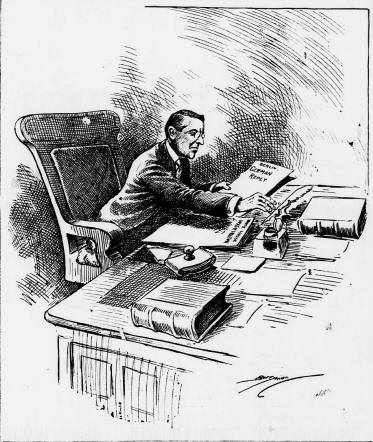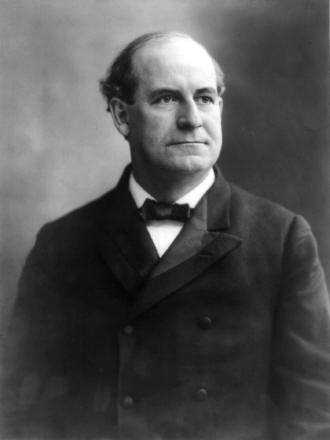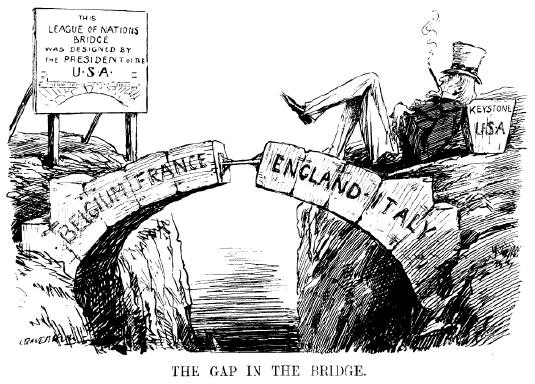June 1915
 June 4
June 4
In its reply to President Wilson’s note demanding an explanation for the sinking of the Lusitania, the German government expressed regret for injuries sustained by Americans and offered compensation in cases in which Germany is found to be in the wrong.
The main points of the German reply to the American raised questions as to just what sort of vessel was sunk. The Germans are requesting a determination of whether the Lusitania was a peaceful passenger liner, as assumed in the American note, or an auxiliary cruiser of the British Navy, carrying concealed cannons and
ammunition.
Another question raised was whether or not ammunition and explosives carried in defiance of American laws accelerated the sinking of the ship, which might otherwise have been expected to get its lifeboats away safely or reach the coast.
The German reply states that in the case of the Lusitania it was acting in justified self-defense, in seeking with all the means of warfare to protect the lives of its soldiers by destroying ammunition intended for the enemy.
Upon receipt of the German reply, President Wilson began work on a new note to Germany in which he asked definitively whether Germany intends to cease submarine warfare, with the threat of a break in diplomatic relations should Germany continue its use of submarines.
On Thursday, after a siege of three weeks, the great fortress of Peremysl, in Galicia, fell to the Austrians. The Russians were in possession of it for little over 20 days. While it had been well known that the Russian position at Peremysl was serious, to say the least, and at the artillery fire other German allies was
becoming daily more terrific, the announcement from Vienna of an Austrian victory was not expected so quickly, particularly in view of the official statements from Petrograd last Monday saying that the Austrian grip before the fortress had been broken and that the offensive in the great Galician struggle had passed to the Russians.
When the Russians starved out the Austrian garrison, an operation, which brought them into the fortress on March 22, they did it slowly and systematically, conserving the lives of their men as much as possible. The method which the Austrians have employed to accomplish the same has been entirely different. Their expenditure in
men and ammunition has perhaps outdone anything in this war.
The retaking of the fort already has been characterized by British observers as one of the most remarkable feats of the war. Immediately after the surrender of the Austrian garrison, the Russians began a westward rush through Galicia, and it was predicted that they would soon overrun the planes of Hungry. In response a
terrific Austrian-German offensive was inaugurate which drove the Russians back and enabled the German allies to encircle the fort an attack it from the north in the southeast here it
On the Southern front, Turkish losses in the Dardanelles fighting to date total more than 60,000 according to private advances from Constantinople. Turkish forces defending the Dardanelles are currently 275,000, a formidable force, especially as the positions they hold are of great natural strength. Against then are only
80,000 allied troops. Moreover, the Germans unquestionably have improved the Turks transport and therefore the allies must not expect to reach Constantinople without a severe struggle.
Romania is now occupying the seat of uneasy neutrality, lately held by Italy. The diplomats of the near East evidently are working hard to bring about and understanding between Bulgaria and Romania. Rumors are rife that Romania is mobilizing an army of 1 million men, which is said to be in splendid condition.
The addition of Bulgaria and Romania to the ranks of the allies however is predicated upon a plan whereby Bulgaria obtains territorial grants from Romania, and Romania will get Transylvania, which is the eastern part of Hungary. Under this plan, Romania will go to war against Austria, and Bulgaria against Turkey.
The lull on the western front continues, as the French and British armies await the outcome if the battles now taking place in Austria and Turkey.
June 11
 On Wednesday, Secretary of State William Jennings Bryan issued his resignation, stating that he differs with the President on the content of the proposed second note to the Germans.
On Wednesday, Secretary of State William Jennings Bryan issued his resignation, stating that he differs with the President on the content of the proposed second note to the Germans.
In a statement issued to the press following his resignation, Bryan said: "Two of the points upon which we differ is on the lack of a call for the of investigation of the sinking of the Lusitania by international commission, and, second, the failure to warn Americans against traveling on belligerent ships or cargoes of
ammunition.
"I do not know if Germany would accept the offer of an international commission, but our country, should, in my judgment, make the offer. Such an offer, if accepted, would at once relieve the tension and silence all those demanding more. Germany has always been a friendly nation, and a great many of our people are of German
ancestry."
"The second point of difference is to the course which should be pursued in regarding to Americans traveling on belligerent ships over the cargoes of ammunition. Why should an American citizen be permitted to involve this country in war by traveling upon a belligerent ship that will pass through a danger zone?
"The question is not whether an American citizen has the right, under international law, to travel on a belligerent ship, the question is whether he ought not, out of consideration for his country if not for his own safety, avoid danger when avoidance is possible. It is a very one-sided citizenship that compels the government
to go to war over a citizen's right and yet releases a citizen of all obligations to consider his nation's welfare."
Mr. Byran's resignation has unquestionably presented an awkward situation politically and a dangerous one internationally. Sources close to the President do not believe the second note to Germany will lead to war, but that on the contrary it will clear the atmosphere by giving Germany a better understanding of the position of
United States government and lead to negotiations which will end in a peaceful settlement in that event,
On the battlefield, all eyes continue to look toward Galicia, where fighting continues on all fronts. It appears that the Austrian-German armies are still sweeping back the Russians.
In Turkey, a combined general offensive against the Turk's positions was begun yesterday and Winston Spencer Churchill said that the allied forces are within a few miles of victory. According to Churchill, the Gallipoli operations have been necessarily slow. After landing, the first Allied forces had to be supplied with
necessary artillery and reinforcements to enable them to attack the Turks, who occupied very strong positions and have been delivering repeated attacks on the British and French lines.
June 18
German opinion, it is said, is unanimously against granting the American demand for assurances that American ships and lives would not be endangered by submarine warfare. The feeling in official circles in Washington, however, continues to be optimistic that a way would be found for peaceful settlement of the issue. Hopes were
based upon the friendly character of the new note, which they regard as opening the door to a satisfactory resolution to both sides.
It was officially stated that a second note would soon be sent to Great Britain and her allies, insisting on a change in the operation of their blockade of Germany, and to make the allies also conform with the principles of international law forbidding interference with trade and non-contraband articles passing to and from a
belligerent country through a neutral country.
It was generally believed that the note to the Allies would be an important factor in convincing the German government that the United States would maintain the same vigorous position on the safety of neutral shipping with respect to the Allies as has been the case with Germany.
In a statement issued by William Jennings Bryan, the former Secretary of State, Mr. Bryan disclosed that the President had differed with him as to the time when the note to the Allies would be sent, but that the intention to censor the allies in the correspondence had been agreed to.

Bryan declared that the note to the German government had been materially altered and softened after he resigned his post in the cabinet, although not sufficiently to warrant his withdrawing his resignation and suggested that Germany in anger, may break off diplomatic relations with the United States and that war is still
threatened. He said danger of war would not be lessened unless America expresses itself in favor of peace in preference to a war for redress of such grievances as we have against Germany.
Yesterday, the distinguished in many walks of life gathered at historic Independence Hall in Philadelphia to consider the adoption of a proposal for a League of Peace. The meeting attracted well-known publicist, educators, peace advocates, editors and economics and was presided over by former President William Taft.
The plan was largely the idea of the former President and is understood to have the personal though unofficial endorsement of President Wilson. President Taft declared he was firmly of the opinion that a League of Peace could be formed, which would enable nations to avoid war by furnishing a practical means for settling
international quarrels.
President Taft, likened the proposed League to the states in the American Union and said there is no reason why nations of the world could not federate in a somewhat similar way. The judicial tribunal of the Council proposed in the League of Peace could settle disputes between nations much in the same way as the Supreme Court
of the United States settles disputes between the states. The proposed League, Mr. Taft said, may not abolish war, but would make it more improbable. "If we can prevent war for 20 years", he said, "we have at least accomplished something."
On the battlefronts, the situation in the eastern arena of the war, where the Austrians and Germans are straining every nerve to deliver a crushing blow to the Russians, remains of the utmost importance.
Reuters estimates that the total Austrian and German forces operating against the Russians are not less than 45 German and 26 Austrian army corps, about 2.8 million men. It is believed that the Germans have seven Army Corps or 280,000 men in the Baltic provinces as well.
In face of the German onslaught, the Russians have abandoned their positions on the San River and are retreating towards Russian Poland, and will soon be forced from all occupied Austrian territory. As a result, they may be forced to retreat on a wide front in central Poland.
If the Austrians and Germans succeed in driving the Russians out of Galicia and dispersing the Russian armies in the South, the Russians will not be able to mount a serious offensive this summer, and there will be great difficulty in bringing about useful coordination with the activities of the Allied armies in the west.
Although no big forward movement has been made in the Western arena, the fighting has been almost continuous along the line with thousands of men dying daily.
The Belgians experienced their first gas attack the night of June 9 when the Germans, after severe bombardment, launch the gas. They took a Belgian advanced post and capture the first two lines of trenches. Large reinforcements, including a British regiment, counterattacked vigorously and drove the Germans back.
June 25
Germany announced that the famous sea raider, the submarine U-29 was rammed and sunk by a British tanker flying the Swedish flag after the vessel had been ordered to stop. The sinking is expected to have a direct bearing upon the negotiations now being carried on between the United States and Germany in regard to her submarine
war upon neutral shipping.
German naval officers point to the sinking as proof that it is impossible for German submarines to treat merchantmen in the way requested by the United States, or to take steps to ascertain the nationality of ships displaying neutral flags in the war zone, so long as British captains will willingly ram German Submarines.
The loss of the German undersea boat undoubtedly will stiffen the nation in the believe that it is impossible to introduce any changes in summary methods so long as Great Britain does not at least withdraw its instructions regarding the flying of neutral flags and attacks upon submarines.
The greatest factor that is believed today by high administration officials to be working favorably in Germany towards a satisfactory answer to the United States demands for the discontinuation of submarine warfare is the fact that Germany is going to need money before the war is over, and the United States is the only country
in which she can get it. Therefore, Germany must not draw the United States into the conflict as a new enemy.
Germany cares little for the physical help that the United States could give the allies. She does not fear United States soldiers or navy, but she fears America’s huge sums of gold. Germany has all the men she will ever need until the close of the war, even if the struggle last several years longer. Her factories enable her to
keep far ahead of her enemies in quantities of the arms and ammunition, but Germany is not well supplied with gold. She has enough for many years and her banks are still in fine shape, but gold can not be made like cannons, rifles and powder, and it must be paid out for certain supplies.
Looking forward, as she now is, to a long and grueling struggle, in which money will play the final roll in the decision, Germany wants no enemy of the United States. On the contrary, the Germans see thousands of wealthy American sympathizers ready to give a helping hand in the yellow metal unless the government stays them, as
it would if the country of what a state of war with Germany.
On the battlefields, the strongly fortified Galician town of Grodek, where it was predicted the Russians would make a stubborn stand, has fallen before the Austrian and German assault. The river Tenew, believed to be another strong barrier, has been crossed; and the Austrian and German forces are within a day march of Lemberg,
capital of Galicia. Should Lemberg be retaken, Austria will have reclaimed virtually all the entire province of Galicia.
The capture of Lemberg was one of the earliest important successes of the Russians. Following it they pushed onward rapidly through Galicia. The high watermark of the invasion found almost all the province in their hands. They approach within striking distance of Kraków,
at the western end of the province close to the German frontier, stormed the heights and passes of the Carpathian mountains, which separate Galicia from Hungary, and threatened to sweep down through the crown lands to the Romanian frontier.
All this has changed by the steady succession of Austrian and German victories of the last few weeks. The changes began with the launching of a great drive for Kraków eastward. Great numbers of German troops were sent to assist the Austrians as well as a vast
amount of field artillery. The use of artillery by the Teutonic allies has been described by correspondence as a scale never before undertaken.
The Austrian and German armies pushed forward westward through Galica, recapturing Przemysl, June 3, and then, without pause, struck at Lemberg from the south and the west. At no point were the Russians able to withstand the terrific bombardment directed against their positions.
The fighting in this campaign has been of unusual intensity with heavy losses. The figure of killed, wounded and captured as given in Austrian, German and Russian official statements runs into the hundreds of thousands.
On the Southern front, the Greek government declared that the current allied approach attempt to take Constantinople via the Gallipoli Peninsula was impossible and that only an attack through Bulgarian territory would cause the Greek government to consider shedding her neutrality and joining the allies.
Bulgarian however said it would never permit the use of its territory unless the allies guaranteed sufficient territorial concessions from Romania and Greece. Any violation by the allies of Bulgarian territory, said Bulgaria would result in the Bulgarians joining the Teutonic allies.
Read past editions of News Reports From the Front